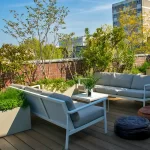A roof garden is a green space located on the top of a building, typically designed to provide a natural and peaceful environment in an urban setting. These gardens have become increasingly popular in recent years as more people look for ways to incorporate green spaces into their everyday lives. Not only do roof gardens provide a beautiful outdoor space, but they also offer a number of environmental and health benefits.
One of the primary benefits of a roof garden is its ability to help reduce the urban heat island effect. In cities, buildings and pavement absorb heat, causing temperatures to rise significantly. By creating a green space on the roof, the plants and soil can help absorb sunlight and cool the surrounding area. This can help reduce energy consumption for cooling buildings and improve overall air quality.
Additionally, roof gardens can help manage stormwater runoff in cities. The plants and soil in a roof garden act as a natural filter for rainwater, reducing the amount of runoff that ends up in storm drains and ultimately in rivers and streams. This can help prevent flooding and reduce pollution in waterways.
In terms of health benefits, roof gardens provide a tranquil space for relaxation and socialization. Studies have shown that spending time in nature can reduce stress and anxiety levels, as well as improve mood and overall mental well-being. Rooftop gardens offer a convenient way for city dwellers to access nature without having to travel far from home.
Roof gardens also provide habitat for birds, insects, and other wildlife in urban areas. By creating green spaces on building rooftops, we can help support biodiversity and create a more sustainable urban environment. This can have positive effects on local ecosystems and contribute to the overall health of the city.
Overall, roof gardens offer a range of benefits for both individuals and the environment. From reducing the urban heat island effect and managing stormwater runoff to providing a peaceful space for relaxation and supporting biodiversity, these gardens play a crucial role in creating more sustainable and livable cities. As more people recognize the value of green spaces in urban areas, roof gardens are likely to become even more popular in the future.















